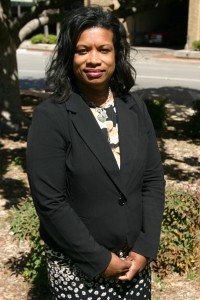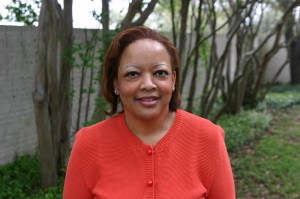In District 8, which stretches through southeast Fort Worth, Gray has proved to be friendly, accessible, and enthusiastic during her short stint on the council. She’s been warmly accepted by city staff even as she’s pushed to improve streets, mow vacant lots, and boost code enforcement in her neighborhoods.
Along the way she’s made some tough political decisions, such as bucking preservationists to support Texas Wesleyan University’s plans to tear down a landmark house to make way for campus improvements.

“I don’t have a problem saying no,” she said. “Everybody up here [at city hall] knows that too. If I don’t agree with something, I’m not going to do it.”
She’s running against an even feistier challenger. Hicks became the youngest woman ever to serve on the city council when she was elected in 2005. She quickly earned a reputation for being willing to butt heads with anybody who stood in the way of improvements in that traditionally overlooked part of town.
City employees who spoke on condition of anonymity characterized Gray as having a decent grasp of the issues and good business sense, while also working well with others. They considered Hicks to be more outspoken, emotional, and grandstanding. Her council peers took the unusual step of removing Hicks as mayor pro tem in 2009, a position she had held for three years. The demotion was viewed as payback for clashing with then-Mayor Mike Moncrief and other council members.
Supporters say that speaks to Hicks’ independence and passion.
Hicks, on the other hand, points to last year’s controversial redistricting as an example of how the incumbent’s relative lack of experience might have hurt her district. Potentially lucrative commercial areas near Spinks Airport and FM 1187 were removed from District 8, much to the chagrin of some in the community. Hicks said she wouldn’t have stood for it.
“I’m going to continue to be a fighter,” Hicks said. “That’s why I’m working 24-7 to regain my position.”
Gray, like Espino, is a tireless campaigner. Neither is going to lie down just because a couple of blasts from the past want to make grand returns to the public stage.
At a recent political forum, Gray touted her accomplishments on the council and described how much she enjoyed her job. She finished with one final promise that drew some snickers and applause: “I’m not going anywhere.”
The subtle jab at Hicks wasn’t lost on the crowd. Some are still riled that she vacated her seat in midterm, necessitating the special election that cost taxpayers $267,000, according to city records.
“Kathleen deserted us,” Meadowbrook neighborhood activist Mike Phipps said. “She’s getting a little rejection from most of us, and I don’t think she was expecting that.”

Phipps also accuses Hicks of lying about her residence to qualify to run in District 8. Hicks and her mother, retired State District Judge Maryellen Hicks, co-own a 2,700-square-foot town home in District 9 that is appraised for tax purposes at $300,000. They have received a homestead tax exemption. Residents qualify for an exemption only at their principal residences.
Hicks, however, said she lives in District 2 with a longtime friend, in an 1,800-square-foot house appraised for tax purposes at $85,000.
Questions about her residency are “just something that is being used to take away from the important issues,” she said.
And she defends her decision to relinquish her council seat midterm, saying the new congressional district was a “once in a lifetime” chance to do more for her constituents.
“If I had won the congressional seat, I would have worked just as hard and represented them and been able to bring even more funds and representation to them,” she said. “It doesn’t make sense to ask why I quit.”
She finished third in a field of 11 candidates. After she failed to make the runoff, she angered more residents by endorsing Dallas’ Domingo Garcia over Fort Worth’s Marc Veasey in the runoff. Garcia had made what were considered disparaging remarks about three of Tarrant County’s biggest employers, Lockheed Martin, General Motors, and American Airlines while he was campaigning.
Hicks said she endorsed Garcia because, despite his criticisms of local employers, he had a strong record of supporting civil rights and was a better voice for the people. She viewed Veasey as too closely connected to special interests.
Beyond that, she said, she and Garcia were respectful of each other on the campaign trail, but she and Veasey clashed. “[Garcia] never threw any stones at me, whereas I had a lot of stones thrown at me by the other candidate,” she said.
Hicks also stepped on downtown toes during her years on the council. She twice voted against the city budget when she didn’t think her district was getting a big enough piece of the pie. And she resisted creation of a tax increment financing district, or TIF, proposed for the West 7th Street redevelopment. She convinced city leaders instead to create a TIF along East Berry Street in her district.
With a huge bond election planned for next year, Hicks wants to be in a position to make sure her district gets its share of the money.
Gray too has earned criticism in political circles. Shortly after she was elected, she and other council members approved the controversial redistricting plan.
When Gray agreed to relinquish the areas around Spinks Airport and FM 1187, those areas went to District 6. In exchange, District 8 increased its percentage of African-American voters. The Rev. Carl Pointer accused her of hurting her district financially just to improve her voter base.
“[District 6 council member] Jungus Jordan was happy to get the airport, the jobs, so Kelly could make the district blacker,” he said. “That kind of thinking is antiquated. It’s not about black and white anymore. The real issue is who can represent your community.”
District 8 has potential growth areas of its own, even without Spinks and the surrounding area, Gray said.
“The driving factor behind those decisions was making sure we were in line with the Voting Rights Act,” she said, by not diluting minority voter strength. “There was a higher number of Anglo residents there [near Spinks], and with any future development it would push those numbers even higher.”
Too many Anglo voters might make it tougher to elect a black candidate, and that could make the city vulnerable to a lawsuit for violating the Voting Rights Act, she said.
Ramon Romero ran against Gray in last year’s special election and lost in the runoff. He and other neighborhood leaders later asked Gray to hang onto the airport.
“We got slaughtered in redistricting,” he said. “We were stripped of some of those potential income generators. It’s something you have to be ready to fight for, and she didn’t have the experience at the time. Kathleen Hicks would not have made that mistake. I would have been supporting Kelly right now, had she heeded the advice of the community.”
Questions also remain about Gray’s former employer, United Riverside Rebuilding Corp. City housing officials say they are owed $220,000 by the nonprofit affordable housing group, where Gray was the executive director until she resigned to run for city council. The nonprofit allegedly provided housing for two clients who were later determined to be ineligible for assistance, and the city wants its money back. The dispute has dragged on since 2008, and a settlement is still being negotiated.
“It’s still a back-and-forth,” Gray said. “Now that I’m on the council, I don’t have an involvement in it.”
On May 11 some of those council faces might change, even if the group’s general philosophy and direction don’t. All nine council seats are up for election. But five — the majority — are uncontested. Mayor Betsy Price, along with incumbents Joel Burns, Jungus Jordan, Dennis Shingleton, and “Zim” Zimmerman, drew no challengers. Two other incumbents, Frank Moss and Danny Scarth, are facing challengers but appear to have fairly strong footholds in their districts.
In other words, don’t expect any big shifts in the city council’s stances on the really weighty issues like natural gas drilling, the Trinity River Vision project, and corporate tax relief.
Then again, for some residents any change is welcome. Gary Hogan, president of the North Central Texas Communities Alliance, has frequently argued with the current crop of city leaders over the abundance and intrusion of urban drilling sites.
“We know what we’ve got now is not good enough,” he said.












“We know what we’ve got now is not good enough.” With the current disfunctional city council I have to say, that is the understatement of the decade! Just more problems created because we have had the same number of council members since 1924 when our population was only 160,000! Hopefully all this discussion about redistricting problems will underscore the need for a larger more effective city council.
Bad enough the FWISD School Board suffers from self-seeking politicians like Vasquez who use their elected positions as steps on a ladder to further their personal amibition. We don’t need the City Council to move backward by re-electing the same kind of self-seekers – people who already turned their back on voters and the city once to further their political ambitions. Hick’s residency issue deserves closer scrutiny. Didn’t her “long time friend” raise residency issues about one of the School Board challengers?
looks like someone knows something….care to elaborate?
Unfortunately we began the “move backward” by electing Mike Moncrief and Danny Scarth, and by allowing this city to operate for 89 years with the same number of council members/districts for that same period of time….thereby allowing for the level of official corruption and misconduct that we have today. Until Fort Worth wakes up and smells the coffee by insisting that our mayor fulfill her campaign promise of a larger more inclusive city council, you will continue to have discussions about whether or not candidates are qualified for office….which is of course a waste of time with the above scenario.
Granted, it will probably never happen, but until Fort Worth citizens discover that the entire process of city government is flawed, discussing the residency, qualifications and experience of individual candidates is a complete sham. As long as we allow city government to divide and conquer by separating all of us into manageable and easily manipulated neighborhood associations and groups, I don’t see that happening.
My Mr. Coffee is brewing away…..has the wake up aroma found you yet Fort Worth? Probably not….with all due respect!
Wow, is Hicks “longtime friend” her lesbian lover? Not like it’s a big secret that she likes the ladies.
What does that have to do with anything?
What does that have to do with anything? Find something relevant to judge her for.
Desiree, What does that have to do with anything?
She has proven that the only thing she cares about is her political ambition. She left eneryone in the lurch once. If you vote for her again, she will jump ship at the first opportunity. It is not about serving the community with her – it is about serving self.
https://www.fwweekly.com/2013/04/10/toxic-legacy/
This has been swept under the carpet long enough.